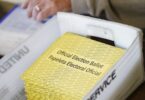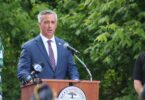Billed by the Dean Malik campaign in the weeks before the Republican congressional primary debate as the “Brawl in Bristol,” incumbent Congressman Brian Fitzpatrick and challenger Malik took to the stage in an effort to differentiate themselves in the eyes of voters.
The debate was almost immediately more divisive than last week’s Democratic debate at the community college’s Gene and Marlene Epstein Campus at Lower Bucks in Bristol Township.
Even before the debate began in earnest, Fitzpatrick recognized the difference between the candidates running to be the Republican candidate in November.
“That’s not a bad thing, that’s a healthy thing,” Fitzpatrick said during his opening statement.
Having different perspectives on where to take the country is a strength in the system, the congressman added.
“Those who know me would consider me to be a staunch conservative, almost to a fault,” Malik said during his opening statement. “Someone who wins the race as a Republican has a duty to go to Washington and act as a Republican.”
During his opening statement, Malik attacked Fitzpatrick’s participation in the bipartisan No Labels Caucus, which Malik quickly labeled the “Chameleon Caucus.”
The first question posed by moderator Bill Pezza, an instructor at the community college, asked candidates where they viewed themselves in terms of wanting to compromise and wanting to stand firm in ideological values.
“I believe in going to Washington to stand on principle,” said Malik, an attorney from Central Bucks County.
Republicans, Malik said, are the only ones who are told to soften their values and compromise. When appropriate, Malik would indeed compromise on issues.
Fitzpatrick said that it is important for members of the government to know and understand what they do not know. His job as a representative, Fitzpatrick said, is to listen to problems and not to lecture people on how to solve them.
Pezza’s second question asked candidates to place themselves in relationship to the party in power and more specifically, President Donald Trump.
Fitzpatrick answered Pezza by saying that he supports ideas that help the district and opposes ideas that do not help the congressional district.
Malik explained that he does support president Trump and his agenda.
“Of course I am not in lockstep, but I do support his agenda,” he said.
Trump was elected with a mandate, Malik explained, and argued that Fitzpatrick actively works against pieces of Trump’s agenda.
Pezza’s next question centered on the idea that Congress has faltered in its role in keeping balance amongst the branches of government. He asked the candidates if they agree, and if so, what can be done to restore that balance.
“The legislature has to go to Washington and it has to move forward on an agenda. The problem is that we have a Republican party that is mortified by its own platform in places and we have representatives who call themselves Republicans. They campaign as Republicans. They fundraise as Republicans. But then they go to Washington and they shed the label Republican and they don’t support that agenda,” Malik said.
Fitzpatrick explained that the congress needs to reassert its authority on a number issues including war authorizations and instituting government reforms such as term limits and “no budget no pay.” He added that America needed a return to a citizen legislature, where representatives arrive and contribute before returning home would be a great thing for the country.
Pezza’s fourth question returned to the tax reform passed by the Trump administration. He said that Democrats assert that the bill will result in a net loss for the average taxpayer and went on to ask the candidates whether or not they did, or would have supported the tax bill.
Fitzpatrick voted for the law and explained that the bill is better than the law that was previously on the books.
[The previous tax law ]was a monstrosity. It was a job killer,” Fitzpatrick said.The growth of the gross domestic product as an indicator of the health of the economy meant that it was time for a change, Fitzpatrick said.
Malik said that he would have “absolutely” voted for the bill, adding if he would support more flat and permanent tax cuts.
Pezza followed up the original question by asking whether the candidates believed the Democratic assertion that the bill will end up costing average people.
“By and large, the overall feedback we are getting is that people are benefitting,” Fitzpatrick said. “The way the economy responds will tell the story in a fuller way.”
Pezza moved to the deficit to ask about fighting the financial imbalance, once a mainstay issue for Republicans.
“I think the pillar of the Republican party needs to be fiscal and personal responsibility,” Malik said.
The economy needs to grow in order to offset the deficit increase allowed in the latest tax code, both candidates said.
Pezza’s fifth question was the first and last to ask the candidates about their opinion on immigration issues. The question, split into four parts, asked candidates their opinion on extending legal status to former DACA recipients, or “Dreamers,” whether the candidates support a path to citizenship for the Dreamers, whether the candidates support an extension of legality for other undocumented immigrants, and whether they support a path to citizenship for those same people.
“I will save you the time. No, no, no and no,” Malik said to Pezza.
“Any immigration reform package has to include a border component and a dreamer component,” Fitzpatrick said. “We have been dealing with a porous border for way too long, and we are seeing the consequences of it.”
The congressman, a resident of Middletown, said that there needs to be a compassionate and humane answer to the dreamers question.
“To me, it is about rule of law,” Malik said when prompted for a longer answer by Pezza. “They simply do not have a right to be here.”
“There are American Dreamers, too,” Malik said.
The endgame, according to Malik, would include opening up honestly to “Dreamers,” giving them incentives and chances to return to their homeland.
“They’re kids, for crying out loud, you can’t hold kids responsible for what their parents did,” Fitzpatrick said.
Pezza asked the candidates about their views on the Second Amendment and if they would be prepared to support any federal reforms.
It is possible to protect the communities and the Second Amendment at the same time, former FBI special agent Fitzpatrick said.
“We have to respond in some form or fashion to make sure that we do everything possible to stop that from happening again,” he stated, referring to the recent school shooting in Florida.
Changes were made after September 11th to make the country safer and the reaction to gun violence should be no different, Fitzpatrick said.
Malik, a Marine Corps. veteran, argued for an increase of security at schools in the way that security at airports was increased after the terror attacks in 2001.
“It is a simple solution to truncate the Second Ammendment, but it is not the right situation,” Malik said. “The answer is in part to take mental health seriously and instill a culture of life and respect in the United States.”
Malik said that he believes universal background checks would be unreasonable and infringe upon Second Ammendment rights.
Fitzpatrick said he cosponsored the bill suggesting background checks.
“I do not believe that criminals should have weapons. I do not believe that people with violent histories should have weapons but that is a constitutionally guaranteed right,” Malik said.
Pezza next asked the candidates if they can explain America’s trade policy and asked them what they believe it should be.
Malik opened the answers by arguing that unfair restrictions make it impossible for America to compete with countries like China and other nations with lower labor standards.
“I am in favor of free trade, but it must be smart free trade,” he said.
“Global trade is necessary,” Fitzpatrick said. “We live in a global economy and must trade globally, but only if the trading makes sense for America. American traders must hold partners to the same standards in terms of labor and environmental standards that we hold ourselves.”
Pezza asked the candidates about the Trans Pacific Partnership, commonly known as the TPP, which Trump announced he was pulling out of last year.
Malik argued that the deal cedes too much power to China and benefits Wall Street elites more than regular folks.
“We need them to rise to our standards on those factors, we can’t dip down to theirs,” Fitzpatrick said.
The next question Pezza asked was in regards to the extent to which Russia worked to interfere in the election and what America must do to make sure it does not happen again.
“This should not be a political issue,” Fitzpatrick said.
“Congress must continue sanctioning Russia and being tough on the nation.”
“It oughta bother all of us and we should want to stop at nothing to stop it from happening again,” the congressman said.
Malik fired back by calling the notion that “Russia walked Americans to the polls to vote for Trump” an insult on democracy.
“I was at the polls on election day, and I didn’t see and Russians there,” Malik said to muffled laughs and cheers.
Russia didn’t deliver the election to Trump, Malik went on to argue.
Moving to more recent news items, Pezza asked the candidates to share their views on developments with North Korea and how they would proceed in the immediate future.
Fitzpatrick said that he would continue diplomatically and remarked that a nuclear strike from North Korea could still present an existential threat to America.
Malik used the opportunity to argue for the strength of leadership president Trump has presented on the issue, saying that recent breakthroughs are due to strong up front leadership.
Both candidates said that, upon further progress, inspections must be carried out to ensure that North Korea is keeping any potential deal. Fitzpatrick said the international inspectors must carry them out, while Malik said American inspectors would be best.
NATO came up when Pezza asked the candidates what their opinion on NATO moving forward is, and how it can be viewed in terms of NATO encroaching in eastern Europe.
“NATO is critically important, obviously, and we need to expand its reach into eastern Europe,” Fitzpatrick said.
“Having the people of eastern Europe on our side would be a great boon,” he added.
Malik argued that NATO should not be used to instigate a second Cold War and that Russia is “rationally uncomfortable” with the expansion of NATO into eastern Europe.
Pezza asked the candidates how it is possible to strike a balance between supporting allies in eastern Europe and not antagonizing Russia.
Fitzpatrick said that it is important to support allies of eastern Europe and it is important not to appease the “sinister motives” of Russia.
Malik responded by arguing that Russia has no sinister motives in the region and is acting in its own best interest.
Pezza’s final two questions were intertwined due to recent moves made by Trump in the region. Pezza asked the candidates if America is wasting time by being involved in Syria due to Russia’s obvious influence over the nation or whether America should take an active role. He then asked the candidates if they think Congress should have a stronger check on presidential war powers.
Malik explained that America should not simply cede influence in the region but should also not get involved with congressional approval.
Malik seemed to disagree with Syrian leader Bashar al-Assad being called the leader of an “oppressive regime” and said he was protecting “Christians and minorities.” He stated those opposing al-Assad in Syria are Islamists who carry out crimes. He said the issue is being viewed improperly as a fight between good and evil.
“I support the United States having a smart approach to this. We should not tolerate weapons of mass destruction and chemical weapons,” he said.
The president has not come close to stretching his war power rights, Malik said of recent limited American, British, and French air strikes.
“I think that it was a good and morally correct thing to do, assuming the intelligence was good.”
The congressman started his response by saying no one should be defending al-Assad because he murders his citizens.
Fitzpatrick said that Trump should have gotten approval from Congress before the strike, but they likely would have have approved it. Although he feels Trump has not crossed the line, Fitzpatrick added that Congress must reassert new congressional checks.
On the issue of the potential creation of a Kurdish state, Malik argued that the land would need to come from a diplomatic angle of the nations in the region. Fitzpatrick echoed the sentiment by saying that the creation of the state is a question for the nations in the region.
Before the end of the debate, Pezza gave each candidate the chance to bring up a topic of their own to discuss.
Malik brought up the issue of concealed carry reciprocity, a measure Fitzpatrick supported until the vote came, Malik said.
 Fitzpatrick defended himself by explaining that he never cosponsored the bill and the legislation changed at the last second. He further added that the Fraternal Order of the Police shifted support away from the bill due to concerns.
Fitzpatrick defended himself by explaining that he never cosponsored the bill and the legislation changed at the last second. He further added that the Fraternal Order of the Police shifted support away from the bill due to concerns.
Fitzpatrick took the moment to endorse moving away from “this ridiculous Hatfield vs. McCoy brand of politics.” The style is tearing the house apart, Fitzpatrick said. Bipartisanship, such as exhibited in the Problem Solver Caucus, represents the future of the nation.
Having bipartisanship is a reason Fitzpatrick has moved along legislation in his first term, he said.
Malik rejected the notion: “The future is for Republicans to be Republicans.”
Having a number of voices in the race is an important thing, Fitzpatrick said, adding differences of opinion are fine, as long as those differences are expressed civilly.
“I think that you’re giving people a choice, and that is why we are here and I congratulate you on that,” Pezza said to the candidates.
Editor’s Note: Publisher/Editor Tom Sofield’s father, Chris, is the campaign manager for Republican Dean Malik’s 2018 bid for congress and his mother, Ingrid, is the treasurer.














